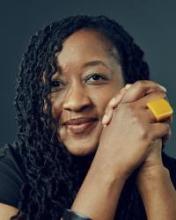Program Supports Digital Humanities Projects that Advance Social and Digital Equity
AES is so proud to announce that our very own LaShawnDa L. Pittman has been awarded a 2024 ACLS Digital Justice Seed Grant!
The American Council of Learned Societies (ACLS) Digital Justice Grants Program supports digital projects across the humanities and interpretative social sciences that critically engage with the interests and histories of people of color and other historically marginalized communities through the ethical use of digital tools and methods. The program is made possible by a grant from the Mellon Foundation.
Professor Pittman has been awarded for the project, "The Black Grandmother Worldmaking Library," which is a collaborative, community-based model for gathering, archiving, and digitizing our "libraries" (Black grandmothers' stories and cultural inheritances, e.g., material possessions, cultural traditions, rituals, language, etc.) across multiple, preservable websites that will be strategically and complementarily linked. This publicly accessible digital resource allows Black grandmothers to contribute to and control the stories we tell about their lives. It builds on the work of LaShawnDa Pittman and Trelani Michelle, who aim to repair what we are taught about understudied and misrepresented populations (e.g., Black grandmothers, the Gullah Geechee community) and to reclaim their narratives and culture using firsthand accounts. The other member of the principal project team is Trelani Michelle.
"The Black Grandmother Worldmaking Library" is one of that has been awarded ACLS Digital Justice Seed Grants of up to $25,000. Grantees will have the opportunity to collaborate with the Nonprofit Finance Fund on developing a long-term financial plan for their projects.
"This year's awarded projects go above and beyond simply centering marginalized communities in their digital outputs," said Keyanah Nurse, ACLS Program Officer of IDEA Programs. "They offer critical perspectives that name how systems of power and privilege function, creatively mobilizing digital tools to imagine-and actualize-more ethical, intentional, and just ways of producing knowledge, fostering collaborations, and advancing social equity."
This year's competition, which had an 140% increase in applications, introduced the new priority of capacity building, seeking to fund projects that bolster the local ecosystem of digital humanities at their respective academic, community, or cultural heritage institutions. This addition furthers the program's broader redistributive aim of supporting scholars based at institutions with fewer resources available for this type of work.
